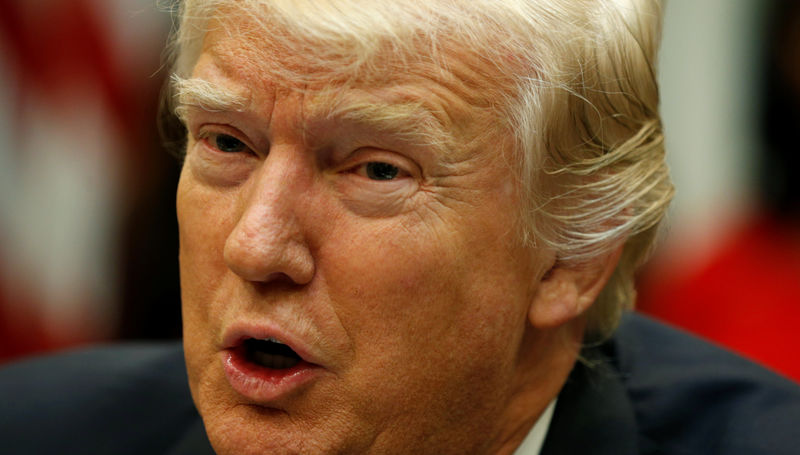By Richard Cowan and David Morgan
WASHINGTON (Reuters) - President Donald Trump, after nearly a month in power, has yet to unveil major legislation or publicly endorse bills from others, getting Republicans off to a slow start on the sweeping reforms they promised on the campaign trail.
As Trump and Republicans ricochet from crisis to crisis, lawmakers have lowered expectations for legislative action in 2017 on tax reform, health care, financial regulation, jobs and infrastructure, with some urging more White House guidance.
Trump has spelled out few specifics on such issues in his more than two dozen executive orders, proclamations and memoranda. A temporary ban on U.S. entry by refugees and people from seven Muslim-majority countries was blocked in court.
Ambitious campaign promises by Trump helped the Republicans make a clean sweep of the White House, the Senate and the House of Representatives in November's national elections.
Movement on legislation could come soon now that the Senate has confirmed nine of Trump's Cabinet nominees and is poised to approve others soon, despite delays by Democrats.
But concern is mounting among some Republicans and moderate Democrats who had hoped for more at this stage.
On taxes, for instance, Republican Senator Lindsey Graham told Reuters, "What I'd like to see the administration do is lead on this issue." The White House needs to "either come out with their own tax cut plan or weigh in pretty quickly," he said, "I'm getting unnerved that there's lack of coordination."
Last week, Trump promised a "phenomenal" tax plan within weeks but offered no details. Nor has he firmly endorsed or opposed tax reform proposals being debated in Congress.
At a party retreat last month, lawmakers warmed to remarks by Trump that seemed to show support for a House Republican "border adjustment" tax to encourage exports and discourage imports. House of Representatives Speaker Paul Ryan issued a statement saying Congress and Trump were "on the same page."
But the enthusiasm was short-lived. The White House later said border adjustment was only one option. After a week, Ryan said tax reform legislation would not appear until mid-2017.
Democratic Representative Jim Himes, who has talked about working with Republicans, said in an interview that promises of "day one" action have rung hollow. "Instead, we are torn apart by poorly drafted executive orders, tweets, Russian ties to the White House," he said.
At a press conference on Thursday, Trump said he would submit an "initial plan" on health care in March and tackle tax reform after that. He said, "Tax reform's going to happen fairly quickly. We're doing Obamacare. We're in the final stages."
CONTRAST WITH PREDECESSORS
Trump's legislative record lags some, but not all, recent presidents. Democrat Barack Obama laid out an economic stimulus plan days after his January 2009 swearing in and signed it into law less than a month later. Republican George W. Bush sent a tax cut proposal to Congress less than three weeks after taking office in January 2001. It was enacted four months later.
Democrat Bill Clinton fulfilled a central campaign promise in his first weeks in office when he enacted a family-leave bill on Feb. 5, 1993. Republican George H.W. Bush accomplished little of note in his first 100 days, while his predecessor Republican Ronald Reagan sent dozens of detailed budget cut plans to Congress less than a month after his 1981 swearing in.
In an Oct. 22 campaign speech, Trump vowed to work with Congress to introduce "broader legislative measures" in the first 100 days of his administration to reform the tax code, repeal and replace the Affordable Care Act, boost job creation, curb job offshoring, spend $1 trillion on infrastructure and build a wall along the U.S.-Mexico border.
In his first 27 days, Trump has not yet offered any legislation to advance these goals.
Investors have not been deterred. The Dow Jones industrial average has surged roughly 12 percent since he was elected.
"Right now there is a lot of hope in the market, but so far I haven't seen Trump show that he knows how to manage policy or have much of a plan," said Thyra Zerhusen, co-chief investment officer of Fairpointe Capital in Chicago.
'PROCEEDING WELL' - HENSARLING
Trump signed a bill into law on Tuesday repealing an Obama administration anti-corruption rule that required oil and mining companies to disclose payments to foreign officials.
Republican Representative Jeb Hensarling, who attended the signing ceremony, said, "Things are proceeding well."
Legislation to repeal the Affordable Care Act, known as Obamacare, and replace parts of it will be unveiled after a 10-day House recess that begins on Friday, Ryan said on Thursday.
Republicans have been struggling to come up with a detailed plan for replacing Obama's signature domestic policy that they have vowed to repeal.
At the outset of Trump's term, Republican lawmakers, lobbyists and tax experts were planning to repeal Obamacare in February, then begin revamping the tax code in March.
Now, House Republicans say they may pass a tax-reform bill by August. That would force the Senate to take up the issue at the start of the 2018 midterm election season, a bad time for lawmakers to be making hard decisions.
From the start of the new administration, some Republicans had jitters about Trump's moves, such as his battle with the media over the size of the crowd at his swearing-in ceremony.

"He should be talking about how we're going to be reforming healthcare," Republican Representative Charlie Dent told reporters on Jan. 24. "I hope he gets more focused on policy."